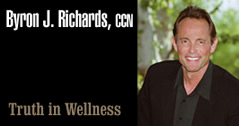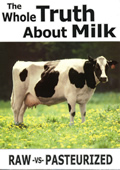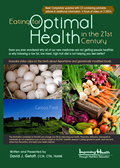FIVE
KEY THINGS TO LOWER LDL CHOLESTEROL HEALTHFULLY
PART 3 of 3
By
Byron J. Richards, CCN
February 27, 2011
NewsWithViews.com
In addition to LDL functioning as a UPS truck it also does double duty and functions as a police car. While this system of economy wouldn’t go over very well in our politically correct society, our bodies always try to employ efficiency. While the antioxidants that are loaded on board your LDL-UPS truck are intended for cells, assuming you have any on board in the first place due to consumption of them, they can also swing into action to help deactivate inflammatory/toxic problems encountered in your blood stream or elsewhere in your body. This requires your LDL to engage a problem and attempt to neutralize it with its antioxidants. If LDL wins the battle, then you are protected. If LDL loses the shoot out then it becomes damaged itself. If you don’t have enough HDL to tow truck the damaged LDL back to your liver in a hurry, then it can be absorbed into the walls of your arteries to become plaque.
The idea behind taking a statin is to lower the LDL so this is less likely to happen. But what about all the cells that need extra cholesterol to fix themselves?
Taking antioxidant and anti-inflammatory nutrients can be incredibly helpful in this situation, to address the source of the problem. In your diet this means higher levels of fresh fruit (especially berries), vegetables, and whole grains. But keep in mind, the over-arching issue is one of wear and tear. This means you must figure out how to balance the stressors and demands on you, compared to your relaxation and rejuvenation, as a primary strategy. While dietary supplements can protect you in hard times, they will not replace stress management and lifestyle management skills over the long haul. I should also point out that this same issue is behind the elevation of blood pressure as well, which often occurs in tandem with elevated LDL.
Thousands of studies on a vast array of nutrients show that dietary supplements can protect your LDL, boost your HDL, protect your arteries, protect your liver, and reduce inflammation. Don’t think of any single nutrient as a magic bullet or cure, rather consider them as part of your stress management team. You can use as many as you like. A combination of a wide variety of them is often helpful because they work in different ways. The greater the demands on you and/or the greater the wear and tear you feel, the higher should be your intake of a variety of antioxidant and anti-inflammatory nutrients.
My top choices in addition to the tocotrienol form of vitamin E and magnesium that I have already mentioned include DHA, coenzyme Q10, grape seed extract, resveratrol, quercetin, curcumin, green tea, hawthorn berry, horse chestnut, pomegranate, silymarin, acetyl-l-carnitine, olive leaf extract, chlorella, and citrus flavonoids. Any of them, or some combination of them, could potentially be of help to you. This is by no means a complete list.
Solution #4 – Restore Cellular Oxygen Utilization, Fix Thyroid Problems
Thyroid problems are invariably associated with poor metabolic pace within cells, which includes the rate that cholesterol is used by cells for normal function. Subclinical hypothyroidism is associated with elevated LDL cholesterol. Most people with elevated LDL cholesterol have many symptoms of poor thyroid function whether their thyroid lab test numbers are fine or not. What is going on?
Thyroid hormone sets the pace of metabolic activity within cells, the rate at which oxygen and calories are combined to produce energy. This highly influences key gene signals involved with cellular cholesterol and fat metabolism, sterol-regulatory elementary binding proteins (SREBPs) and peroxisome proliferator-activated receptors (PPARs).
The primary solution for fixing this problem is not taking thyroid hormone; it is exercise – especially improving aerobic exercise consistency and intensity. The supporting role of nutrition in this capacity is to enhance energy production within cells and to help you get a better response to exercise. Any time you build more muscle then you have more cellular engines that can combust oxygen and calories, thereby improving gene conditioning for both cellular cholesterol and fat metabolism. Every time you successfully get a good response to aerobic exercise you have delivered more oxygen to your cells, burned more calories, and taken your cholesterol and fat burning genes out for a test drive.
No nutrient by itself, and certainly no drug, will fix this reason for elevated cholesterol better than exercise fitness. And that includes helping to correct all manner of thyroid problems – even for people on thyroid medication who would like to get off (assuming they still have a thyroid gland).
This issue is linked to the previous three topics in this article. Excess food causes leptin resistance in your brain, in turn signaling your cells to run in starvation mode and thus set thyroid to a very slow pace. Unfortunately, the excessive calories showing up at your cells don’t match up very well with the faulty brain signaling that has instructed your cells to go in slow motion. Thus, following the Five Rules of the Leptin Diet along with implementing Solution #1 and Solution #2 will go a long way to taking stress of this issue. Solution #3 revolves around inflammation and free radical damage, which throw a monkey wrench into thyroid function at the gland level, the liver activation level, and the cell level.
Nutrients that help your cells implement thyroid instructions by enhancing the production of energy can go a long way towards normalizing SREBP activity within cells and thereby help out with normal cellular cholesterol balance and function. This is where nutrients like pantethine, niacin, zinc, iron, and coenzyme Q10 can really come in handy. A faltering energy level is the key sign you are really having a problem in this category – thus anything you do to help your energy helps fix it – including getting a better night’s sleep or not cutting your sleep short.
The key nutrient that helps activate your PPAR in cells is the fish oil DHA. Another novel compound that helps is pterostilbene, found in small amounts in blueberries and typically extracted from the bark and heartwood of the Indian kino tree (pterocarpus marsupium) for use as a dietary supplement.
The tendency during aging is to lose muscle and aerobic fitness, which readily contributes to poor cell function and elevated cholesterol. Unfortunately, blood pressure medication can cause the cholesterol to go up or make the existing problem worse. This is because blood pressure medication actually reduces the flow of oxygen to cells, inducing poor thyroid function within cells (the opposite of exercise fitness). I’ve seen this in clinical practice a number of times and I’ve never seen a study on it – nor do I expect one any time soon.
The bottom line is that physical fitness enhances thyroid functionality at the cellular level which directly impacts the key genes in your cells that govern a cell’s use of cholesterol as well as fat-burning in general. When cells don’t use cholesterol properly it tends to pile up in your blood and force the improper elevation of LDL.
Use it or lose it. This solution hinges on improving your energy level and improving your physical fitness. There are no short cuts or quick fixes.
Solution #5 – Reduce Your Toxic Burden, Especially from Your Own Digestive Tract
It is a little appreciated fact that that LDL cholesterol, in addition to its UPS truck and police car duties also acts as part of your poison control center – like having little livers floating around in your blood that help bind up toxins so they can be removed from your body. The reason this is so little appreciated by Big Pharma is that lowering LDL with statins, if this problem is going on, will cause organ damage and increase cancer risk by stripping away a primary defense against being poisoned. Unfortunately, this problem is common in people who have elevated LDL cholesterol.
Let me use the example of LPS (lipopolysaccharide), because it is an example the medical profession can understand. LPS is a very well understood toxin, coming from the cell wall of gram-negative bacteria. Thus, in an acute sense the degree of poisoning (toxemia) from any gram-negative bacterial infection, like food poisoning, is based on how high the LPS levels rise in your blood. The metabolic problem is not so acute, so you don’t feel ill in the traditional sense. Rather, it is a low-grade poisoning that is a primary source of wear and tear that contributes to any disease of aging. It is adequate to interfere with metabolic activity, like throwing sand in the gas tank of a car.
This becomes very important in terms of cholesterol health when you consider the following findings:
1)
Just about all overweight
people have elevated LPS in their blood coming from imbalances in
their digestive tract that are interfering with metabolism.
2) Normal-weight or under-weight people with digestive
problems also have elevated LPS due to hostile “germ gangs”
in their guts.
3) LDL
cholesterol will elevate to protect your circulation against this
highly inflammatory and toxic compound – a vital aspect of defense.
4) The problem of elevated LPS, elevated inflammation,
and elevated cholesterol is now proven in type
2 diabetic patients.
5) You can even get a fatty
liver from this problem.
Antibiotics have now been proven to alter bacteria in ways that produce elevated LPS, possibly for an entire lifetime following their use. The more times they have been used the greater the risk for a problem. This places antibiotic use clearly at the center of the obesity epidemic and the metabolic syndrome of which elevated LDL cholesterol is a part.
Friendly flora and extra fiber are a great place to start in terms of improving this topic. Many other strategies to improve digestive health and detoxification may need to be employed, depending on the individual. I am simply pointing out that this is an important topic that most likely relates to anyone’s elevated LDL cholesterol and simply lowering LDL with a drug could actually expose the body to a higher level of toxic LPS damage – which unfortunately is going on all the time.
| Subscribe to the NewsWithViews Daily News Alerts! |
Summary
In this article I have suggested five strategies to improve LDL cholesterol levels. They center around eating less food, helping your liver deal with stagnation, reducing inflammation and oxidative damage, improving cellular energy, and boosting digestive health. Each solution is helped by a better diet and exercise – which are always the foundation for lasting improvement. Lifestyle and stress management also play important roles. Dietary supplements can be used as tools to assist this process, as desired.
Lowering LDL cholesterol levels is a good idea if they are over 130. Lowering them by addressing the sources for the reasons LDL is elevated not only solves the problem but is associated with a return of health. In my book, that is common sense.













 Share
This Article
Share
This Article






